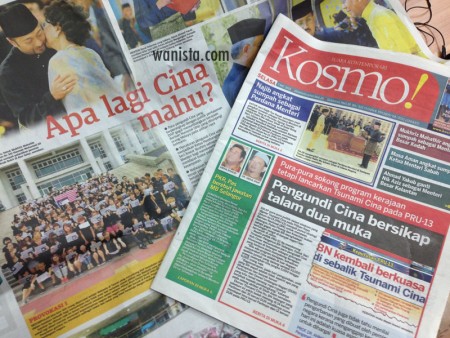For Singapore, due to history, geography, demography, economy and recent political experiences, Malaysia has perpetually been its lynchpin concern and preoccupation. In the past, S Rajaratnam, the Republic’s first foreign minister, had described Singapore’s relations with Malaysia as ‘special’ and there is nothing to suggest that this has changed in anyway. If anything, the ‘specialness’ has been intensified and further reinforced due to a whole array of factors, not least being the imperatives of national, regional and international economics. A weakening United States, an assertive China, an unstable Thailand and a new nationalistic leader in Indonesia can change the political and security architecture in the region to the detriment of both states and hence, their bilateral ties.
In the 1950s and 1960s, culminating in Singapore’s expulsion from Malaysia in August 1965, the emotive dimension of Singapore’s view of Malaysia was dominant. Even though this has largely dissipated, it is not totally absent. Still, the pragmatism with which both states have moved forward is definitely a milestone achievement in bilateral ties in Southeast Asia.
For Singapore, continuity rather than change remains its key perspective on Malaysia. This was especially true after the May 2013 general elections where the Barisan Nasional (BN: National Front) was returned to power albeit with a weaker majority. Still, Prime Minister Najib, the United Malays National Organisation (UMNO) and the BN are in power and that is what matters even though the winds of change must also be disconcerting. The disquiet would be more, not so much from the economic aspect as it would be from the rising racial and religious polarisation of Malaysia in the last few years that was brought to the forefront during the last general elections. The ‘Allah’ issue has not been helpful and the recent firebombing of a church in Penang has merely raised the ante of what this will mean for Malaysia and possibly, even multiracial and multi-religious Singapore.
All that aside, the single most important development of late has been the rising warmth in Singapore-Malaysia bilateral ties under Lee Hsien Loong and Najib Tun Razak. While past imperatives of history, geography and demography remain relevant, most dominant in the new narrative has been the personal warmth of the two prime ministers and the strategic nature of their bilateral ties.
Most of the past issues have been addressed or settled such as relocation of Customs and Immigration Complex, land reclamation and even water. Most importantly, has been the breakthroughs that both leaders have made vis-├а-vis two issues, namely, the resolution of the Tanjong Pagar Railway Station and the land exchange deal as well as Singapore’s support for the Iskandar Development Project in Johor. Other positive developments in ties include the holding of annual leader’s retreats, re-establishment of links between both countries’ stock exchanges, Malaysia’s agreement to sell electricity to Singapore, the agreement to build high speed train link from Kuala Lumpur to Singapore, the amicable post-Pedra Branca technical talks to resolve legacy issues over the islands’ dispute and finally, the establishment of a Singapore consulate in Johor Baru.
If there is one key factor that has brought bilateral ties to a new height, it is the cooperation in the Iskandar Project. Not only is the Singapore Government supporting investments in the project through Government-linked companies such as Temasek Holding but also playing an important role in encouraging the private sector to invest in the project. Additionally, thousands of Singaporeans are expected to be permanently based in the Iskandar region and Johor as a whole, bringing interdependence to a level that was never seen before. To that extent, Iskandar has been the key game changer in Singapore-Malaysia bilateral ties of late.
The breakthrough in bilateral ties was a function of a number of factors. First, the decision by both sides to adopt a new approach to bilateral ties in order to garner win-win results. Second, the personal warmth of the top leaders was extremely helpful. Third, the calculation of the mutual benefits that would be gained by both sides in view of the increasing regional and global competition. Fourth, over the years, there has also been increasing economic interdependence with Singapore as one of the top investors in Malaysia over the last two decades or so. Two-way trade and investments are among the highest between the two states. Fifth, there is also the realisation of increasing security indivisibility of both states. Finally, the ideological pragmatism of both sides has also helped in boosting bilateral ties.
While Singapore expects Malaysia in 2014 to have a largely ‘normal’ year barring any unexpected events – all the more to be the case as the UMNO annual assembly has opted for status quo – the Republic is also mindful of the many uncertainties that can unexpectedly crop up to affect bilateral ties. While 2014 can expect the warming of ties to continue, this cannot be taken for granted. First, the warm ties of two prime minister, both of whom are sons of two former prime ministers who were not close, may not survive personalities if a more nationalistic prime minister takes over in Singapore or Malaysia. Second, tensions could surface if the promised cooperation proves futile or produces one-sided benefits, say in Iskandar Project. Finally, growing domestic tensions in Malaysia, especially among the Malay and Chinese communities in Johor or in Malaysia could spill over into Singapore-Malaysia relations. Hence, for Singapore, while Malaysia in 2014 is expected to continue ‘good business as normal’, there are also potential minefields that might explode, and hence, the need for caution. ‘Special relations’ are important but can never be taken for granted, and this also holds true of Singapore’s view of Malaysia in 2014.
Bilveer Singh is associate professor at the Department of Political Science, National University of Singapore, adjunct senior fellow at the S Rajaratnam School of International Studies and President of the Political Science Association of Singapore.
 Facebook
Facebook  Twitter
Twitter  Soundcloud
Soundcloud  Youtube
Youtube  Rss
Rss 